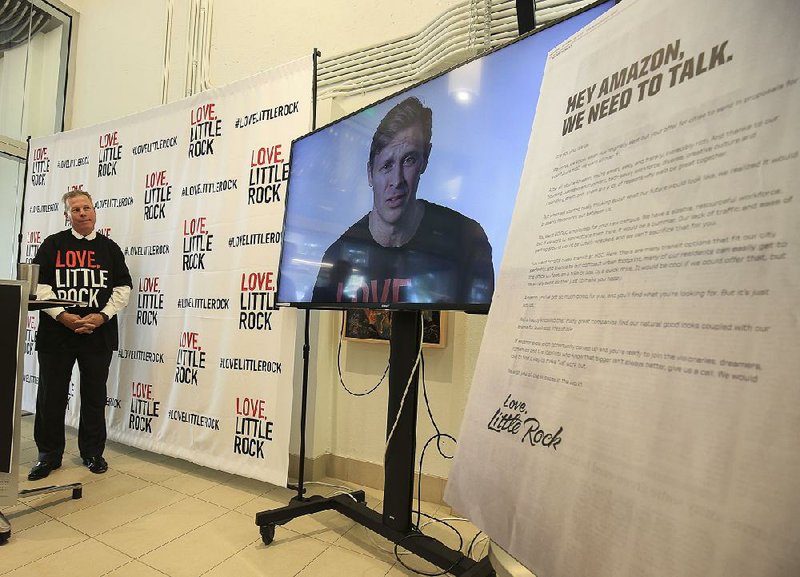Little Rock civic leaders have decided it's better to play the field rather than court Amazon and risk being left at the altar in the online retailing giant's quest to locate its second U.S. headquarters.
On Wednesday, the deadline to respond to Amazon's request for proposals, Mayor Mark Stodola and the top official at the Little Rock Regional Chamber of Commerce, Jay Chesshir, unveiled a new campaign for the city, using the attention the Amazon headquarters search has attracted to build buzz for central Arkansas and perhaps attract other job-creating entities.
"I think we're getting the best of both in the way we're approaching this," Stodola said at the kickoff for the "Love, Little Rock" campaign in The Venture Center at the Little Rock Technology Park.
Even though the mayor said last month that Little Rock would submit a bid for the Amazon campus, which the Seattle-based company said would represent a $5 billion investment and employ 50,000, he and other civic leaders quickly realized the city had no shot.
"From an economic development perspective, the requirements are the requirements and obviously when you don't meet all of those requirements, you do everything you can creatively to find a way to meet them," Chesshir said. "Unfortunately, in this case, we don't have the population, we don't have the international airport."
But they saw an opportunity despite the shortcomings.
"We felt we wanted to be unique and different and work on how we can get their attention" while not submitting a proposal to Amazon, Stodola said.
"We have a lot of things [Amazon is] looking for," Chesshir said. "So our thought process was, let's turn this around, using this project as a reason for us to tell the rest of the world what's good about Little Rock and all these different areas so that we get their attention and hope to attract them as well."
They credited the strategy to Jonathan Semans, an executive at CDI Contractors and a 49-year-old Northern California transplant who enjoys the advantages Arkansas and its capital have to offer but is mystified at the "public relations blind spot" afflicting Little Rock.
"This really isn't about Amazon, but what it was was an opportunity to create new public relations," he said. "Why not take advantage of the [Amazon campaign] and use it as a platform not aimed at Amazon but use it as a springboard to go sell what is great about Little Rock and find the right companies."
The campaign has a website, LoveLittleRock.org, and a targeted social media campaign focusing on site-location consulting firms in New York, Chicago, Dallas and Atlanta. Digital ads targeted the firms, which should have been swarmed with "Love, Little Rock" promotions on websites, social media and elsewhere online on Thursday, Chesshir said.
"It's about creating an image for Little Rock and the metro Little Rock region, attracting the interest of those that wouldn't have necessarily thought of us from a corporate perspective," Chesshir said. "It's about engaging, at least for a finite amount of time, the attention of [the] site-location consulting community because we are the only city in America today doing this."
The campaign, which Chesshir and Stodola said was only beginning, also used what chamber officials described as "guerrilla techniques" to ensure that Amazon saw the city's message.
A tongue-in-cheek breakup letter -- "Hey, Amazon, we need to talk" -- from Little Rock to Amazon appeared in a full-page advertisement in Thursday's Washington Post, which is owned by Amazon founder Jeff Bezos.
And while the majority of the initial campaign relies on social media and digital advertising, among the more conventional tactics was an aerial banner flying over Seattle and the company's headquarters that said "Hey Amazon, it's not you, it's us."
"What we are trying to do ... through a little bit of paid media is create earned media buzz and social media buzz far beyond what we could ever hope to budget for with the size of our organization," Chesshir said.
And, it appeared to work, attracting notice from major news organizations such as ABC News and Bloomberg and hundreds, if not thousands, of social media posts, especially on Twitter.
One example: "A brilliant 'Dear John' letter from Little Rock to Amazon. All of a sudden, everyone's talking about LR & its tech-savvy workforce," tweeted a digital marketer from Colorado.
Chesshir declined to disclose the price for the Post ad. He also wouldn't say how much the chamber paid for the banner that flew over Amazon headquarters.
The chamber's economic development projects are funded by both public and private money. It chooses not to make its advertising and marketing budget public because it competes with other chambers across the U.S., Chesshir said. A portion of the Arkansas Freedom of Information Act that generally makes government records public says "files that, if disclosed would give advantage to competitors or bidders," are exempt from public review.
Little Rock paid $300,000 to the chamber this year to do economic development work on its behalf. In prior years it had paid the chamber $350,000. Other cities do the same.
In 2015, a Pulaski County court ruled that payments to chambers of commerce were a clear violation of the Arkansas Constitution because they got around the provision that bars a city from giving money to a private business without getting anything in return. The cities made the argument that they contract with the chambers for economic development work, but the judge said it was a contract "in name only" because neither the chamber nor the city could list what the city receives from the chamber, specifically.
In 2016, an amendment to the Arkansas Constitution that would allow such payments was listed on the November election ballot and and approved by voters. In 2017, payments by Little Rock to its chamber -- and by other cities to their respective chambers -- began again.
Business on 10/20/2017
